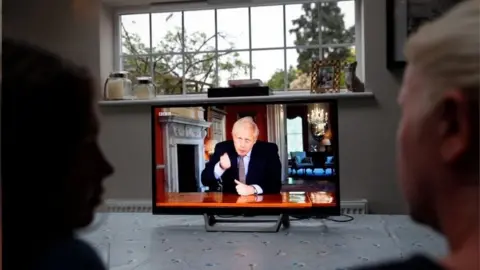Coronavirus: PM's statement prompts questions and gives some answers

 AFP/Getty
AFP/GettyThis is the start - the country's doors being edged open a crack.
More time in the fresh air for exercise everywhere this week, and a timetable of a sort from Boris Johnson for an achingly gradual return to a recognisable life.
In England at least, if you work in construction or manufacturing, or can't do your job from home, you'll be encouraged to go back to work as long as you can keep your distance from others this week.
You'll be able, from Wednesday too, to take unlimited exercise; to meet one person from outside your own household as long as you stay two metres apart; you can go and sit in your local park, to sunbathe, or to take part in sport with others from your household.
But importantly there will be NO change for the many people who are more vulnerable to the disease who are therefore "shielding".
Limited opening
But progress beyond the next few days is a series of big ifs. The ambition is to start bringing back some primary school years from the start of June, but it depends how the outbreak progresses.
The plan is for some secondary school pupils to be able to see their teachers occasionally before the end of the term. But there is no intention though to reopen them before the summer.
There is a hope that from July, some parts of the hospitality trade might be able to open up. But don't take that to mean that pubs will be back in business - rather some limited firms that are able to trade outdoors could be allowed to return. "If" was the word the prime minister said again and again.
The difficult reality for the government though, and for the public trying to understand what these next phases of the pandemic look like, is that different parts of our social life, different parts of the public sector, and different parts of the economy have to move at different paces because there are different levels of risk.
Questions raised
But despite the prime minister's lengthy address there are as many questions raised as answered.
Workers in some sectors have been advised to go to work on Monday but told to avoid public transport. What are employers meant to be telling their staff? What are workers meant to do if their only way of getting to work is by limited public transport? What should the parents of secondary school pupils do if they can go back to work, but their children have no prospect of a proper return?
There was no mention of face coverings, even though the government has been talking about them being a possible part of their plans.
Nor was there a fixed date or detail of when people travelling to the UK by plane will be asked to go into some kind of quarantine.
Importantly for so many members of the public, there was vanishingly little detail of when people might be able to see their extended families again.
And the prime minister's approach is also creating a very real political tension between Westminster and the devolved administrations.

- LOCKDOWN: How will it change now?
- THE R NUMBER: What it means and why it matters
- LOOK-UP TOOL: How many cases in your area?
- EXERCISE: What are the guidelines on getting out?
- SCHOOLS: When will children be returning?

With what are thought to be higher rates of the infection in Scotland and Wales, Nicola Sturgeon and Mark Drakeford have made no bones about their reluctance to move from the "stay at home" message.
The governments have been trying to stick together in the last few weeks but there is very obvious division now - not just over the message and communication, but over the attitude to the workplace.
Any clash like that creates confusion and uncertainty too.
This is what the prime minister described as the "sketch of a plan" - sketches are rough, and can easily be rubbed out.
And it's dependent, at every stage, on how this relatively unknown disease progresses throughout the country.
On Monday a document of 50 pages or so will be published that will answer some of Sunday night's questions.
The prime minister's statement was designed to try to reassure, to show the country that there is the beginning of a way out of this crisis. Yet it has prompted questions and provided only limited answers.
Doubts about Downing Street's approach are spreading beyond the opposition, with one normally loyal senior MP saying: "The backbenches are getting restless; the PM needs to lead."
